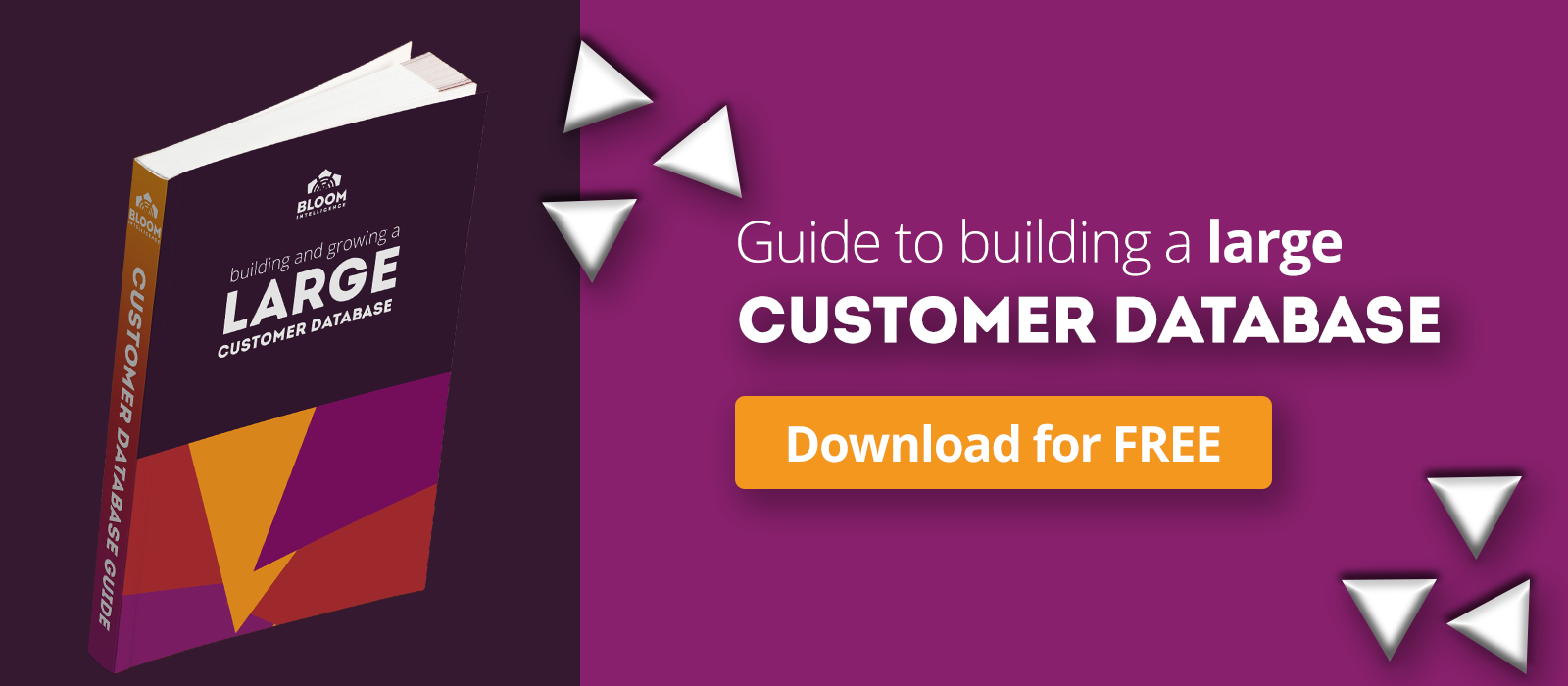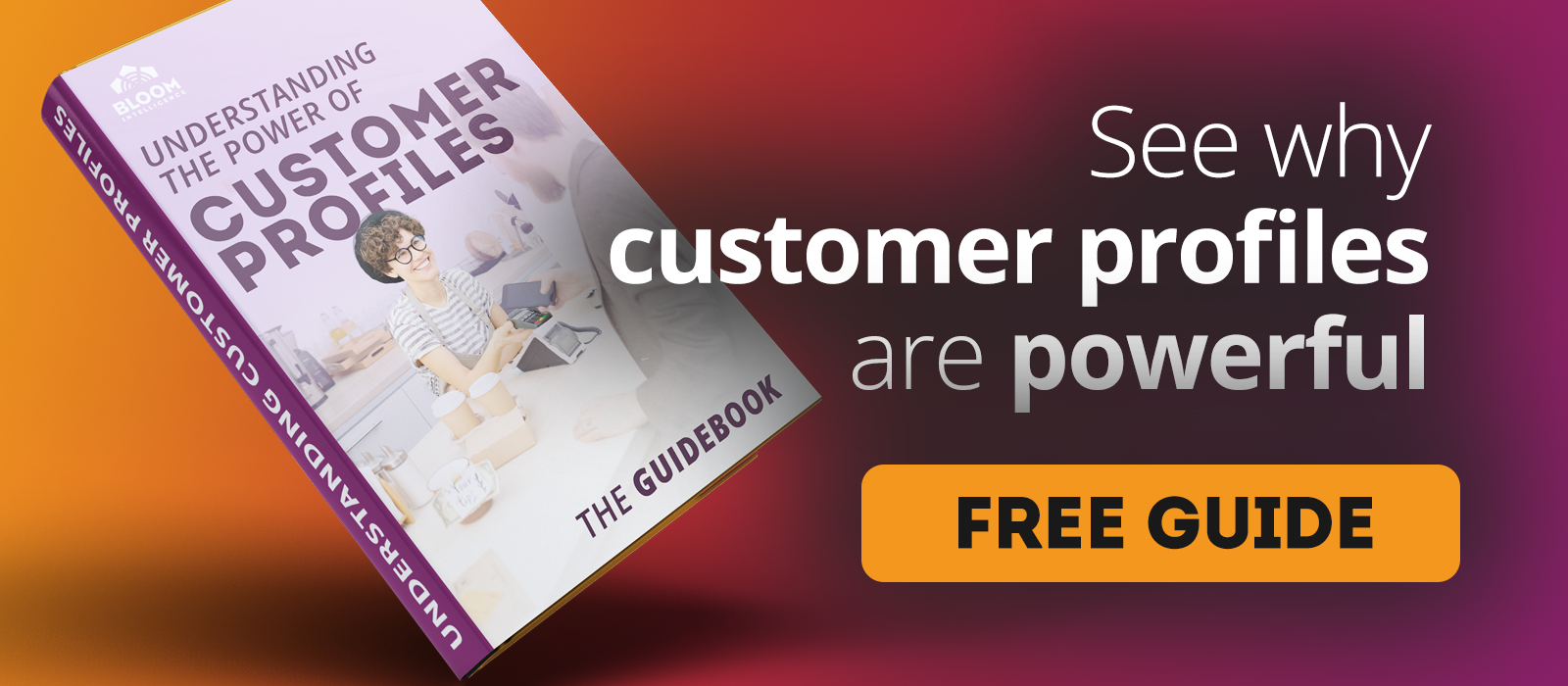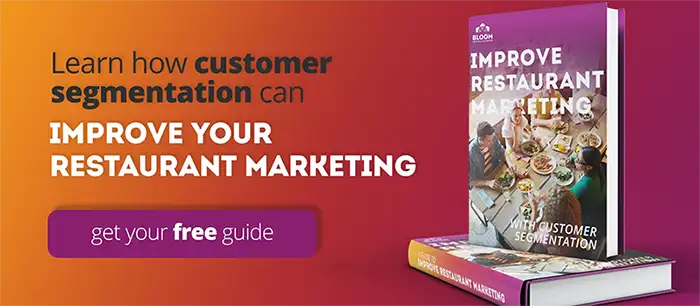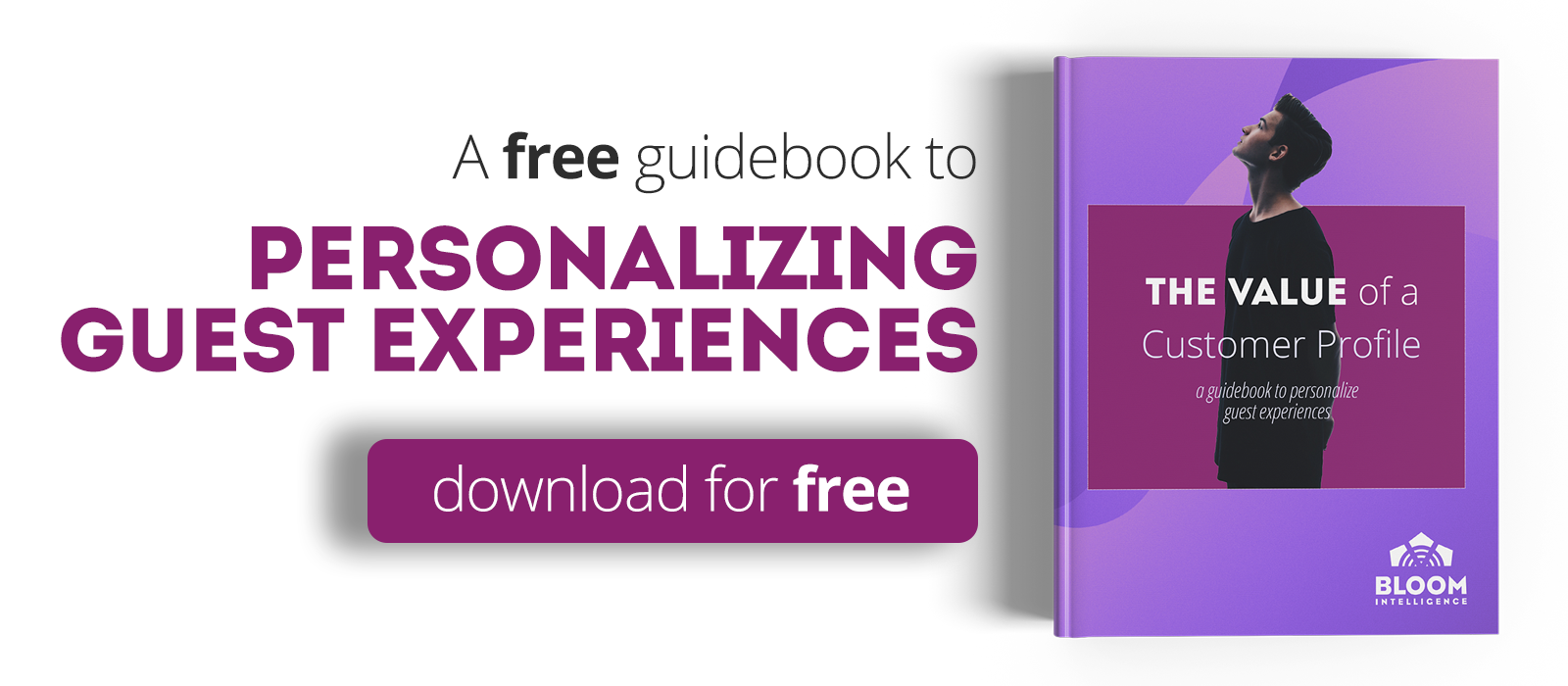Restaurant CRM Databases Can Save You Time and Grow Your Business
Passively unlock guest insights collected from your WiFi, website, POS, online ordering, and reservations, and aggregate into one platform for easy use.
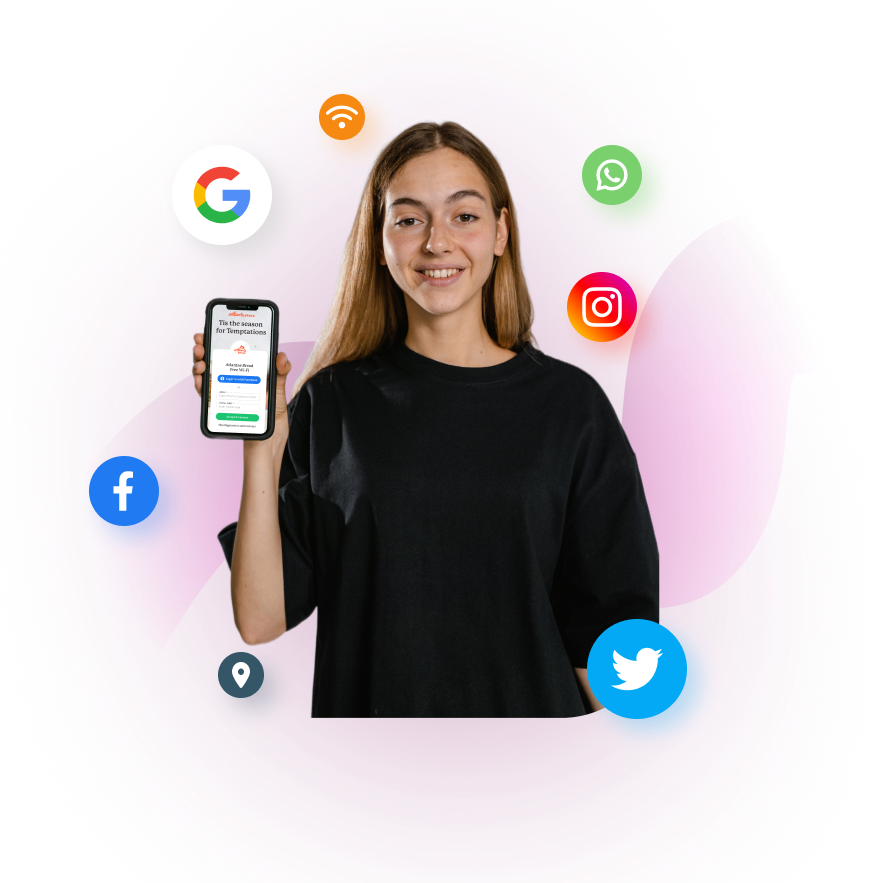
Scroll to explore
What is a Restaurant CRM Database?
A restaurant CRM database is a collection of guest data and customer profiles that can include online and offline behavior, demographics, email, phone numbers, income, ZIP Codes, transactions, and even visit history.
Savvy restauranteurs automatically collect, aggregate, and clean guest data into restaurant guest databases to unlock guest insights, increase customer lifetime values, improve online ratings, and identify and win back lost guests through marketing automation.
No matter what size or type of business you operate, your guests are your number one asset.
So, guest acquisition, retention, and maximizing your revenue per guest should be among your business’s primary goals.
If you manage a brick-and-mortar establishment, such as a restaurant, coffee shop, or taproom, you may not have an efficient way to keep track and know every guest in your establishment.
Building a restaurant CRM is the first step to unlocking unknown guest insights like how loyal a guest is, their likelihood to churn, and their frequency to your locations (and much more).
For example, these guest insights allow you to automate & personalize your restaurant marketing to achieve and measure specific goals such as saving your at-risk guests, building positive online reviews, and increasing your customer lifetime values.
Likewise, the best part is that you can automate this entire process of collecting guest data, unlocking guest insights, and driving tangible results through marketing automation for less than the cost of 1 hour of your time in a month with Bloom Intelligence.
What does “CRM” mean?
 CRM, which stands for customer relationship management, refers to software that will document, monitor, and store guest data in a central database.
CRM, which stands for customer relationship management, refers to software that will document, monitor, and store guest data in a central database.
You can use the data to easily visualize your guest insights. Then, you can use it to make intelligent, data-driven restaurant marketing and operations decisions.
As a result, the restaurant CRM database is a great option for multi-unit restaurants that have too many guests to keep track of manually and want to increase their customer lifetime values.
Or, it is for those who do not have the time or resources to manually enter the collected data into their database, spreadsheet, or other solution.
Blooms restaurant CRM was built for restaurants and other offline businesses to automatically build rich, clean customer profiles and databases quickly, and automate their marketing initiatives.
And it’s all done for you, behind the scenes. This way, you and your staff can unlock your time from manual tasks, and watch your restaurant’s guest loyalty grow.
How a WiFi CRM Database Collects Data
Most CRM database software will collect guest contact information, such as name, email, phone numbers, and are not based on a restaurant’s actual needs. Previously, sales and marketing professionals entered the information.
However, multi-channel restaurant CRMs work differently.
For instance, when a guest’s cell phone enters into the range of your guest WiFi sensors, Bloom automatically recognizes the device’s unique device ID and starts collecting and storing anonymous data such as visit times, dwell time, frequency, and advanced KPIs such as their likelihood to churn.
Then, instead of manual or web-assisted customer data entry into your CRM, customers opt-in via your captive portal page, social, point of sales, websites, or other customer opt-in points.
As a result, this acts as an automated process to build your CRM database without your organization needing to do any additional work.
For example, when your guest opts into your WiFi, orders online, makes a reservation, or engages with other customer opt-in points, a customer profile is created in the CRM database and all previous and future presence behavior data that was collected as anonymous customer data will be associated with their digital profile.
At that point, the guest’s device is no longer anonymous, and it is associated with their customer profile. For example, customer digital profiles include phone numbers, gender, birthday (age), emails, postal codes, presence analytics, zip codes, income, ratings, transactions, and other important guest data points.
Throughout this process, all customer data is being cleaned and analyzed to unlock guest insights like loyalty, churn likelihood, dwell time, and much more.
The Importance of Clean, Verified CRM Customer Data
Many CRM database software solutions will allow guests to enter data that is false. For instance, guests may enter an email address that is entirely made up and doesn’t exist or provide other false guest data.
Unfortunately, these scenarios where you receive false guest data that can be detrimental to your marketing and operations strategies.
Not to mention, the loss of time and money by setting up systems that will not meet their full potential because your guest data was not cleaned and normalized.
So, Bloom verifies all emails in real-time. Additionally, Bloom checks zip codes and phone numbers for accuracy. Likewise, if a guest enters a birth date that appears false, Bloom will ask for their correct birthday.
In the end, the key is having complete, clean customer profiles to personalize your guests’ experiences, resulting in increased customer lifetime values.
What is the real value?
Compared to other CRM database examples or CRMs, enterprise multi-channel restaurant CRMs offer many advantages for multi-unit restaurants.
First, you can quickly build large clean guest databases automatically. As a result, you receive the additional benefit of understanding your guests’ individual presence behavior once they are opted-in.
As customer profiles are being automatically built, you can build a list of tens or hundreds of thousands of customers.
These lists allow you to identify and define your guests categorically. Then you can group them into segments for personalized marketing, advertising, and other demand generation activities.
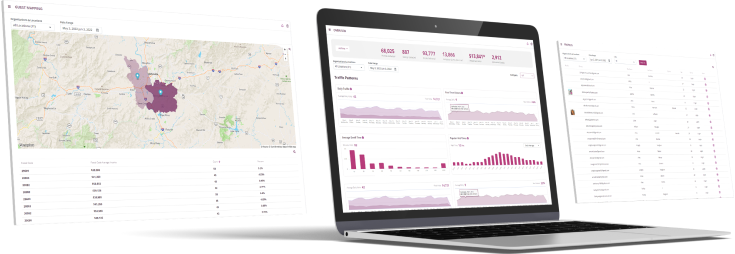
As a result, you can create marketing campaigns that speak much more clearly to each of your segments through customer segmentation. Plus, you’ll be able to speak directly to the pain points and emotions of each group.
Consequently, the process of personalizing your guests’ messaging and experience increases engagement, lowers marketing and advertising costs and keeps your guests coming back to your restaurants.
In addition, you can send offers to each segment or your entire database of customers.
Send Triggered Messages
Additionally, you can send a triggered message asking a question based upon a 5-star review after a guest leaves your establishment.
If the rating is below a particular threshold that you define, you can automatically send another message persuading them to return and give your business another chance.
Also, through our advanced reputation management tools, you can ask a guest to rate you, or if they had a bad experience to contact you directly to make it right.
When a guest directly leaves their rating on Google, Facebook, Yelp, or TripAdvisor, Bloom would pull that review back into our platform for you to manage all guest communications centrally and analyze customer sentiment over time.
Ultimately you are quickly building positive online reviews which drive net new guests into your locations and show your customers that you care. Creating happy, loyal patrons.
“Fantastic personalized customer
experience. Definitely a big help
with the growth of our business.”

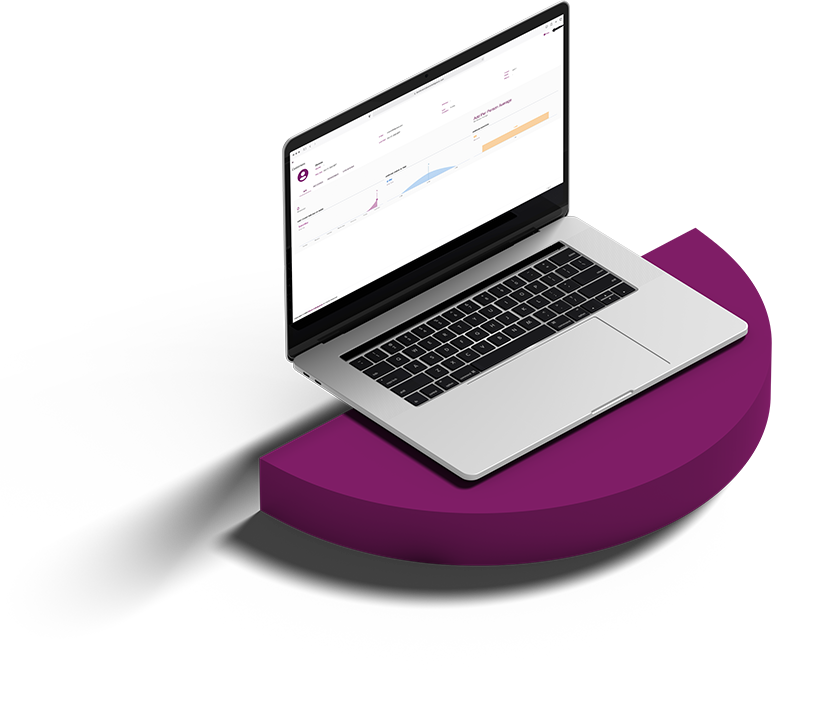
Restaurant CRM Database Benefits
By analyzing your guest visit frequency, the platform can accurately predict when a guest should be returning for their next visit using our proprietary machine learning models. Consequently, if the guest does not return by that date, they are tagged as an at-risk customer.
Then, Bloom will automatically send an at-risk guest an offer at the right time & place prompting them to give you another try.
As a result, Bloom saves up to 38% of all at-risk customers!
So, your organization can save significant amounts of revenue by preventing guests from leaving and not coming back.
Using CRM Insights for Marketing and Operations
You can also send one-off or scheduled/recurring messages to your customer database, or specific segments of it. Likewise, you can trigger marketing campaigns based upon guest behavior if your guest only logs into your WiFi once, orders online, or makes a reservation.
On the operations side, having access to metrics like daily traffic, dwell times by hour, guest frequency, guest rating results, and much more allows you to see data you could not see before that are critical to operational success.
As a result, this transparency into guest behavior and sentiment gives you data to optimize staffing, ordering, and discover problematic trends before they become a larger issue.
“Invaluable to anyone in need of
foot traffic metrics and
retargeting marketing solutions.”

Other Benefits of a Restaurant CRM Database
Centralized Data – There are other benefits to using a WiFi-powered restaurant CRM database. First, you can centralize all of your guest data in one place.
Then, you’ll never have to search for a spreadsheet or weed through business cards to find individual guest contact information again.
Scalable – A CRM database is an easily sustainable, scalable, and powerful tool for business growth. For instance, imagine your business as you grow your location’s footprint.
Unfortunately, the ability to know your guests and understand their behavior at scale will simply be too limited. It is time-consuming to achieve through manual efforts to be practical.
On the other hand, Bloom’s WiFi marketing and guest intelligence hub is completely scalable to any size.
Intelligent Reporting – You can easily create reports to measure the effectiveness of your marketing and operational decisions. So, you can test different marketing messages and optimize your campaigns quickly and easily.
Likewise, you can track any campaign down to your guests walking back into your doors.
Profit & ROI – By comparison, the reason online companies have a competitive advantage is that they are measuring their guest’s behavior on their websites and building large, clean customer databases that they use to personalize their guest experiences and re-market to their guests to maximize profitability.
Indeed, a large, clean database, plus presence analytics, and an advanced marketing suite equals a pot-of-gold that you use to generate real profits.
You Can Start Building a CRM Database Today
Utilizing a CRM database can be extremely valuable for your business, and accelerate its future growth.
Then, you’ll have a greater understanding of who your best guests are. And you can speak to them when, where, and how they want to be spoken to.
You’ll drive engagement, familiarity, and loyalty between you and your guests. You’ll drive solid increases in per-person ticket averages.
And, you’ll decrease guest churn/attrition and increase your customer lifetime value. This is just smart, and it is what Bloom Intelligence can deliver to your multi-location operation.
Get a head start on your competition. Contact us for a free, no-obligation platform demonstration. See exactly how Bloom Intelligence can make your guests happy and drive your business growth. Call us at 727-877-8181 or click here to schedule a free demo. We’ll show you how easy it is.
SAVE TIME, INCREASE CUSTOMER LIFETIME VALUES, CREATE NEW CUSTOMERS
What our happy customers
are saying
“SaaS that covered so many bases for us instead of having to use multiple software products. Bloom Intelligence has simplified our responses to reviews, customer feedback, and more. I highly recommend Bloom Intelligence.”
Robert Sanderson
“Bloom Intelligence really is a step ahead in terms of marketing software and metrics. Their product is reliable, fast and innovative and has helped the company I work for really grow.”
John Marchetti
“Working with Bloom Intelligence has been amazing. They assist you every step of the way and work with you hand in hand to make sure you are optimizing your advertising potential. We are excited to use this tool to help learn more about our customers so that we can personally engage with them and understand our strengths/weaknesses.”
Ariel Ramirez
“In these challenging times, it has been a pleasure working with Bloom Intelligence to help facilitate our service offering to our clients. They were extremely responsive and provided support to mitigate risk and minimize revenue loss. Great partner!”
Stefan Kim
“We’re extremely pleased with the wealth of customer data that we’re able to gather, at a very attractive price. In addition, we’re able to communicate our new product promotions by using the landing page as a digital billboard. A “no-brainer” for anyone working with limited Marketing $$.”
Bob Cross, Vice President of Operations
CRM Database FAQs
What Does CRM Stand For?
CRM stands for Customer Relationship Management database. To summarize, a CRM database is a collection of guest data grouped into customer profiles. So, a CRM can be used to understand your customer base, and for segmented, targeted marketing campaigns that can be tracked for accurate attribution.
What is a CRM Database?
A CRM Database is a digital collection of individual guest information grouped into customer profiles. Likewise, the database consists of detailed guest data such as names, behavior data, demographics, addresses, zip codes, emails, and phone numbers. As a result, these profiles are used to track communication and to remarket to guests.
What are Examples of a CRM Database?
An example of a CRM database for offline companies is the Bloom Intelligence CRM database. For example, using guest WiFi access points & guest WiFi landing pages, the platform collects guest behavior data, whether they log into WiFi or not, and builds detailed customer profiles for marketing and attribution. By comparison, other popular CRM’s include Salesforce, Microsoft Dynamic, and Hubspot.
How Do I Create a CRM Database?
For restaurants, A CRM database can turn guest insights into useable data to improve guest satisfaction and marketing ROI. The easiest and best way to create a CRM database is to use your WiFi access points, Guest WiFi landing page, website widgets, and API’s to collect guest information and behavior data. Then, once configured, your guest data is collected and cleaned automatically.
The Power of a Restaurant CRM Database

Optimize retail &
business operations

Track attribution of
customer campaigns

Trigger marketing
campaigns based on
marketing presence

Measure the health
of corporate & franchisee
locations

Compare locations or
group of locations to
quickly identify opportunities
or threats
Are you ready to grow
your business with a
restaurant CRM database and
Wifi marketing automation?
If so, find out how Bloom Intelligence’s WiFi analytics
& marketing platform measures offline guest
behavior and builds guest loyalty.
So, it’s time to start leveraging your guest WiFi to gain
a competitive edge. Then watch your profits grow.





